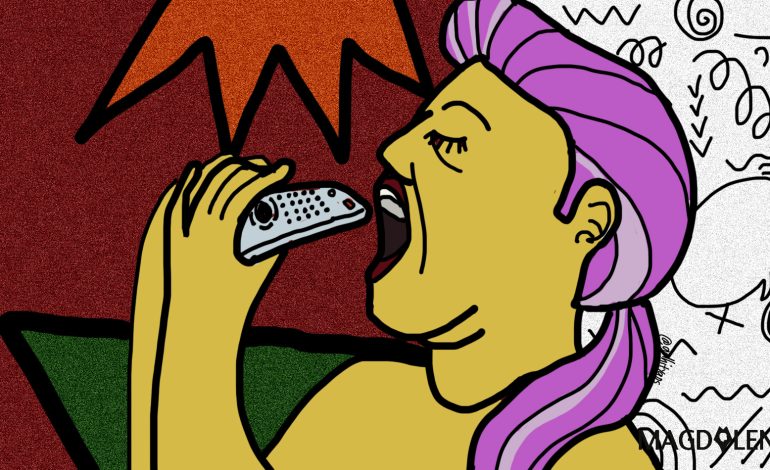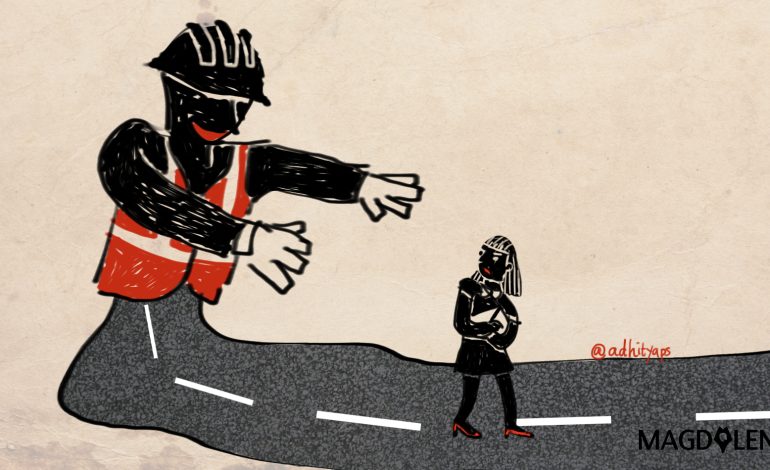Feminism and Pop Culture: Don’t Just Change the Channel

The Victoria’s Secret campaign. The Bachelor franchise with sleazy storyline. The child clothing ad depicting boys as “little scholars” and girls as “social butterflies”. These are just a few examples of how the medium of pop culture is still filled with images of gender stereotypes.
Pop culture is often condescended upon, seen as banalities and mere entertainment. But various studies in the United States show that pop culture has a profound impact on children and teenagers. A study from an American organization called the Media Education Foundation showed that more than US$2 billion are spent annually to target juvenile consumer, and that the average American child will see more than 200,000 acts of violence on television by age 18.
Other statistics on the way media and pop culture influence young people revealed that 42 percent of first to third grade girls want to lose weight, and about 81 percent of 10 years old are afraid of being fat. Young people receive more than 5,260 messages on attractiveness per year just from network television commercials; and 73 percent girls who abuse diet pills and 79 percent of teenage girls who self-purge frequently read women and health fitness magazines.
“About 12 years ago, there was a report released by the American Psychological Association Task Force on the sexualization of girls, and it found that early sexualization starts when they’re as young as two years old and that these images in advertising and pop culture are doing demonstrable harm to the self-image and development of girls and young women,” said Andi Zeisler, the co-founder and creative/editorial director of Bitch Media, a nonprofit feminist media organization based in Portland, Oregon.
“This report looked at the consequences of early sexualization and its impact on girls’ development and on their identity. What’s interesting is that it found that no matter what they learn at home and school about their potential for being leaders and their potential to be self-sufficient individuals, the media and pop culture messages about women were the ones that really resonated with them.”
Zeisler was speaking in a video conference at Kinosaurus on April 22 about pop culture impact, a collaborative event held by Bersama Project, Magdalene and Kinosaurus. She emphasized on the importance of looking at the medium of pop culture because they are inescapable, and how we live in such a mediated world that we cannot get away from it even when we want to.
“Pop culture and media are incredibly central in forming our impressions of the world. It’s how young adults learn to identify themselves and who their friends are. So it’s crucial to take popular culture seriously and not to think of it as something that is separate from real life, but instead as something that inform and reflect that life,” said Zeisler, who has penned several books on pop culture and feminism.
“When we started Bitch, a lot of what we heard was, ‘this is just pop culture, this is just entertainment, it’s not supposed to be real, so don’t take it so seriously, just change the channel.’ And we’ve always said it really doesn’t matter whether or not we personally consume pop culture and media, what matters is that it exists on a massive scale, that it’s bought and sold, and that it has very real effects on all of us.”
Palatable feminism
The last five years has seen a much wider global discussion on feminism, much of this is thanks to pop culture’s embrace of feminist ideas. Beyonce’s 2014 performance at MTV Video Music Awards turned feminism into something that is aspirational and desirable almost overnight. Within 24 hours after the performance, Beyonce was mentioned by two third of tweets and there was a massive spike of search on Beyonce and “Feminist Beyonce”. Shortly after that Emma Watson gave her speech to the United Nations Conference on the importance of gender equality. Meanwhile in Paris Fashion Week, Chanel runway show finale took the form of a feminist rally.
But Zeisler found that this recent phenomenon is still very focused on making the case that feminism is not as bad as people think it is, instead of delving more into the layers of patriarchy.
“A lot of celebrities like Emma Watson who in the past few years have been coming out and talking about feminism are getting quite well known for it in part because they don’t match what so many people seem to believe about feminists and feminism. So, a lot of what they’re doing is making feminism palatable to outsiders, more accessible, but also simpler. The drawback to feminism that is made mainstream and made more visible is that it makes feminism less about activism and more about personal identity,” she said.

Huge corporations began building ad campaigns around the subject of girls empowerment and, suddenly, the media was filled with headlines of feminism and feminists. But, more often than not, appealing to feminism and feminist had become another way to sell products to women. Dove initially presented a viable campaign of diversity of women, but now it “has become much more normative and insistent on shifting the weight on cultural expectation and beauty standard back on to women themselves. It’s still centering beauty as the most important quality that women can have,” said Zeisler.
“What I find troubling and what I have been fighting about is that the aspect of feminism that is currently given voice to in the pop culture and media are the simplest ones. The ones that, for the most part, center on beauty culture and heterosexual relationships in marriage, or on economic success that doesn’t challenge the existing structure of capitalism. For instance, Emma Watson’s speech to the United Nations about getting men investing in feminism in order to better legitimize it. So, my wish is that people who are invested in feminism use their current popularity as a way to talk about a deeper and more complex feminism.”
The fact that pop cultural icons like Beyoncé use feminism as part of their personal brand is potentially great, but also potentially hazardous, Zeisler noted. They command massive attention in ways that a century of women’s movement has not been able to. However, making feminism your personal brand entails making it as palatable as possible to the largest number of people at once, which, inevitably, means it’s going to be simplified.
“So, for instance, you have Taylor Swift, an international pop star whose feminism translates into being friends with women – that should not be a feminist value, it should be kind of given. It’s an inevitable stance, it’s not a policy stance. For people like Taylor Swift or other celebrities to really engage with feminism as a transformational movement requires them to work at the systems that support their careers, and these are systems that are built on fundamental power inequality. So, there’s only so far that kind of feminism can go,” she said.
Cultural Jamming
Zeisler said it is important to look at media and pop culture to think about the ways that they can actually be positive and the way that they can be excellent venues for responding to these challenges. Pop culture can be a lot of fun, and when you are able to make people laugh and think at the same time, that can be an even better route to changing minds than straightforward reporting and advocacy.
Social media has given plenty of opportunities to help affect change to pop culture. The past decades has seen examples of the way pop culture gets “schooled” by a discerning public. Zeisler cited #Oscarsowhite hashtag on Twitter in the past two years as a critique of the Academy Awards and its voting practices.
Listen to Andi’s talk:
There are also a lot more watchdog organizations conducting studies about representation and stereotypes. Their findings get more widely disseminated in social media and blogs.
Said Zeisler: “Obviously, big corporations, the people who make TV and the people who make movies are not interested in changing, especially if they don’t know what it would do to their finances. So it is really important to make it clear that consumers have a great deal of power and can really assert their powers as consumers and as subjects of advertising to draw attention to things like sexism, racism, transphobia, homophobia. It’s not an ideal way to do it because it often comes down to public shaming of company or people or movies or whatever, but, for now, it definitely seems that it is the most effective way to actually make change.”
Media and popular culture have always been a fertile place for activism and what’s called culture jamming, Zeisler said, which is the act of subverting culture of consumerism by explicitly modifying it. She cited the example of a British feminist collective called The Vagenda, which invited readers to recreate excessive sexist tabloid headlines, highlighting how ridiculous the way they talk about women’s appearances is.
A Baltimore-based group in Maryland called Force a few years did a huge cultural jamming by creating Victoria Secret’s actual underpants to draw attention to the messages Victoria Secret are sending. They also hacked Playboy website which does a yearly guide of partying for college students, effectively putting both major corporations in the embarrassing position of having to answer to the questions that their products actually don’t promote consent.
“All of these examples are striking because, even momentarily, they question the kind of dominant narrative that we are encouraged to believe are real, and that has been presented to us as normal and even desirable,” she said.
“Over 21 years that I’ve been doing this, I’ve seen terrible pop culture, a lot of stereotypes, a lot of insult, a lot of real hunt of real people… but I see that pop culture has become more diverse, more interesting and less stereotypical and more reflective of the real world that we live in. To make pop culture better we have to care about it, we have to talk about it. My hope is that people who are invested in pop culture, whether as creator or fans, will continue to try to make it overall fairer, better and smarter.”
What about Indonesia?
Far from co-opting feminism, pop culture in Indonesia is still rampant with messages of misogyny and rape culture, musician and activist Kartika Jahja said in the same discussion at Kinosaurus.

Kartika Jahja (second from left) and Mari Jeung Rebut Kembali collective.
One example is a Bandung-based punk band called Love Chaos, which penned the song Ewe Paksa (Forced Sex), whose lyric is basically a rape manual. And then there is the proliferation of sexist memes, including the one that depicted the “ugly duckling” transformation of Aurel Hermansyah, daughter of singers Anang Hermansyah and Krisdayanti, with the caption “can’t believe she can actually be beautiful.”
“She (Aurel) is basically a child, 14 years old at that time,” Kartika said. “Pop culture still very much objectifies women sexually, not because of our clothes, but because we are women. Just key in ‘cewek jilbab’ (hijabed girl) on Google and the results will have sexual undertones.”
Women who stand up for themselves often have to apologize after being bullied, such as the case with actress Dian Sastrowardoyo, who was condemned for refusing to take picture with a fan. The latter, as seen in a viral video, grabbed her forcefully and Dian let go off her and was seen shuddering.
“Being photographed with fans is not the moral duty of celebrities. She was being bullied because she is protecting her own space and body,” she said.
As musician and singer, Kartika believes pop culture is a powerful weapon and a gateway to insert feminism messages, most notable through her activism with Mari Jeung Rebut Kembali group and their body positive message via her song “Tubuhku Otoritasku” (My Body My Authority).
“I try to be careful not to make feminism as mere branding. I’ve been approached several times by cosmetic brands attempting to present body positive image, but their approach is simplified. I draw the line with those who do not want to delve into real layers of patriarchy,” she said.
As with Zeisler, Kartika agreed to use humor and education to campaign for feminism instead of public shaming and slamming.
“This is more important for us, feminists, to stick together, because we are now facing huge pressures,” she said, referring to the rising conservatism in the country.
Read Hera’s report on the high rate of violence against women in Indonesia and follow @heradiani on Twitter.






















